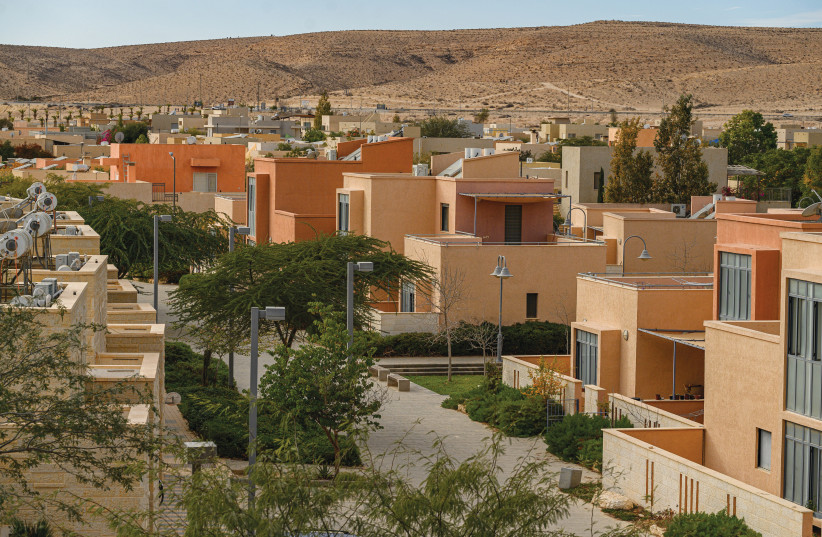Prolonged droughts, storms, extreme temperatures, and hurricanes – the impact of climate change on the daily lives of people worldwide – has significantly intensified in recent years. With approximately 47% of the earth’s surface classified as drylands, the demand for desert technologies and environmental solutions has become more urgent than ever. Israel stands at the forefront of these efforts, showcasing its capability to lead in this crucial arena.
To document these topics, The Jerusalem Post is partnering with Ben-Gurion University of the Negev (BGU) to launch a new section on its website dedicated to environment and climate change.
The initiative underscores the growing recognition of the urgent need to address environmental issues and the role of media in promoting awareness and action.
Raising awareness for environmental issues
“Israel is more than 60% drylands, and worldwide, we have over two billion people living on drylands, numbers that are growing by the hour because of the desertification process,” said Prof. Noam Weisbrod, director of The Jacob Blaustein Institutes for Desert Research at BGU. “Creating a situation that enables a good life according to modern standards on drylands is really crucial for humanity.”
BGU has several schools, departments and research institutes that have been working on solutions for issues related to the climate crisis for decades.

For example, BGU scientists recently published research that can help improve the productivity of solar panels by shedding light on the effects of temperature on the efficiency of photovoltaic solar cells.
Another group of researchers reached groundbreaking results regarding the chemical reactions needed to produce plastic products. This important discovery has the potential to help make more products with less material, byproducts, pollution, and energy. In February, another BGU study showed how artificial reefs can help preserve natural ones.
The new Jerusalem Post portal will feature in-depth coverage of environmental challenges facing Israel and the world. It will also highlight innovative research and solutions, as global temperatures are on track to rise by 1.5 degrees Celsius above pre-industrial levels by as early as 2030, according to the Intergovernmental Panel on Climate Change (IPCC), with devastating consequences for ecosystems, communities and economies worldwide.
Weisbrod pointed out that high-quality journalism can be crucial in informing the public about these pressing issues and driving meaningful action, including shedding light on lesser-known subjects.
“I believe that lately, the media has really been putting the issue of climate change front and center,” he said. “However, specific themes tend to receive most of the coverage. For example, reducing CO2 emissions receives much attention, and the media covers it extensively. But what about other emergencies?”
According to Weisbrod, water scarcity is an essential area to address to fight the detrimental effects of climate-related issues at the global level.
“We used to think about water scarcity as a challenge affecting only developing countries, but now we see more and more instances of that in the Western world – because we are slowly but surely destroying our water sources,” Weisbrod said. “This is why the work of our university is so important.”
“According to the UN, by 2050, almost half of the world’s population will be living in a situation of water scarcity,” he said. We are talking about 25 years from now; it is really around the corner. I hope that the media can help us raise awareness of the issues and persuade world leaders to do more about it.”
For this reason, by providing accurate, timely and comprehensive coverage, journalists can help hold policymakers and businesses accountable and inspire individuals to make sustainable choices in their daily lives.
The partnership between The Jerusalem Post and BGU exemplifies the power of collaboration in addressing complex environmental challenges. The goal of the partnership is to provide readers with a deeper understanding of environmental issues and potential solutions.
“We are excited to partner with Ben-Gurion University of the Negev to launch this new section dedicated to Environment and Climate Change,” said Inbar Ashkenazi, CEO of the Jerusalem Post Group. “This collaboration reflects our commitment to providing our readers with high-quality, informative content that not only educates but also inspires action to protect our planet for future generations."
The Environment and Climate Change portal is produced in cooperation with the Goldman Sonnenfeldt School of Sustainability and Climate Change at Ben-Gurion University of the Negev. The Jerusalem Post maintains all editorial decisions related to the content.
